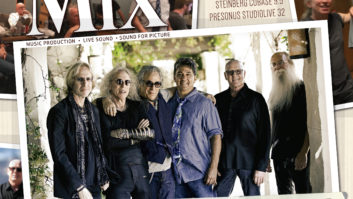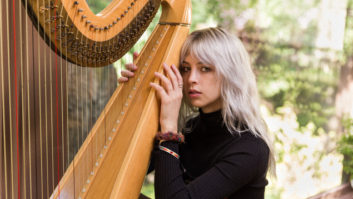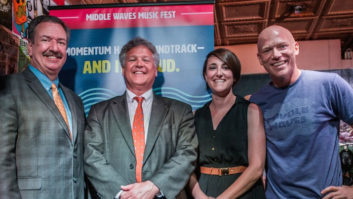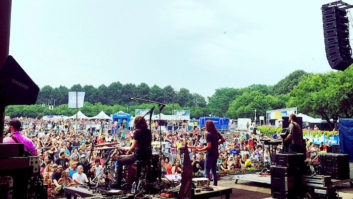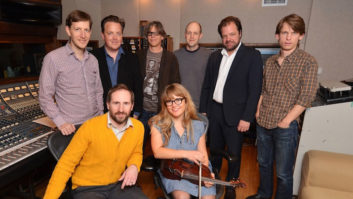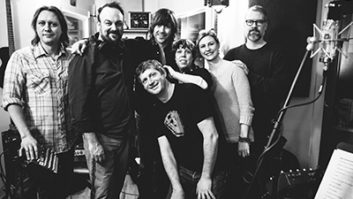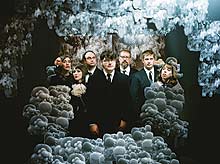
L to R: Becky Stark, Shara Worden, Chris Funk, Colin Meloy, John Moen, Nate Query, Jenny Conlee
PHOTO: AUTUMN DEWILDE
In an era when attention spans are short, songs are often dominated by repeated samples and the album format is becoming a relic, Portland-based band The Decemberists are a distinct anomaly: a group dedicated to the long form. The Crane’s Wife, their 2006 major-label debut for Capitol (after a few indie releases), was an hour-long, late-’60s/early ’70s English folk/rock-style piece inspired by a Japanese folk tale. It clearly wasn’t suitable for Top 40 or so called “modern rock” radio, yet it made it as high as Number 35 on the Billboard Top 200 album chart and was voted the favorite album of the year by NPR listeners.
Now comes The Hazards of Love, singer/leader Colin Meloy’s challenging and dynamic 17-song fantasy Brit-folk/rock suite about a girl named Margaret and various strange characters and places. Meloy and guest vocalists Becky Stark and Shara Worden sing the parts of three characters in the work, which Meloy originally conceived as a musical. The other four Decemberists are keyboardist Jenny Conlee, guitarist Chris Funk, bassist Nate Query and drummer John Moen — and all of them added a multitude of instrumental textures to this music.
By phone from the Portland studio where he does much of his work, Hazards producer Tucker Martine — who also co-produced Crane with Death Cab for Cutie’s Christopher Walla — recalls his initial reactions to Meloy’s latest: “I braced myself for a big-time commitment and cleared out a lot of my schedule. I knew it was going to be perhaps the most ambitious undertaking I’ve been a part of in terms of record-making.”
Martine feels that although Crane had several songs that tied together, Hazards is a more true “concept record,” because if any one of the songs on Hazards were removed, the recording wouldn’t be coherent. “That was also a little bit of a new challenge,” he notes. “Typically, when you’re working on an album, if a song is giving you too much trouble and you’ve tried everything, there’s a point where you might decide to drop that song from the record. We weren’t afforded that luxury, and I found it very exciting.”
From August through October 2008, Martine recorded the band at Kung Fu Bakery Studio in Portland, the same facility used for Crane. The producer/engineer cut all the basic tracks with as many musicians playing together as possible to tape — a Studer 820 2-inch deck at 15 ips through an SSL G Series console.
“Bands don’t really care about room sound and all that stuff studio people put money into,” Chris Funk, the band’s lead guitarist, points out after a rehearsal. “We’ve recorded in many places, such as an old church, and have learned that a good environment is a proper and comfortable studio, beause it always comes up to go to a castle in Ireland or try to find a cool place. Instead, we said, ‘Let’s just go somewhere by our house, with a burrito cart close by and we can go home at night.’
“As a band, we were arranging, rewriting, and learning the material in the studio,” Funk continues. “We played everything live and kept some drum takes from the initial arranging period. But it was a lot of sifting through material to figure out what went where. It ended up being a lot of overdubbing once we got into the fluid storyline.” Due to an enormous amount of editing required for Hazards, especially for the song transitions, everything was later transferred to Pro Tools. Martine kept the sound warm by using API, Neve and Millennia preamps for the extensive array of old ribbons and other mics used. For Meloy, Stark and Worden’s vocals, Wunder Audio CM-7s were put into action.
In addition to playing electric and acoustic guitars, Funk also contributed parts on pedal steel, banjo, piano, drums, hammered dulcimer, percussion, synthesizer, mandolin, autoharp, marxophone, hurdy-gurdy and bouzouki. “You can get carried away,” he says wryly, “and for a while The Decemberists were into ‘instrument novelty.’ But now we’ve gotten really good at arranging and writing parts that make them sound like they’re supposed to be in the songs.
“We’ve become obsessed with British folk and folk-revival music, including Fairport Convention and Richard Thompson, along with Gentle Giant and prog-bands. The song ‘The Hazards of Love 1’ is like a straight-up Pentangle rip-off in my mind,” he says with a laugh.
Mixing was done at Supernatural (located on the outskirts of Portland) during late October 2008. Martine chose the studio because it has an API Legacy that sounds great and had enough inputs for Hazards’ densely layered songs (some of which also feature strings). “It took me about two-and-a-half weeks to mix it,” Martine says. “The other bandmembers came out a couple times, but I mostly talked with Colin over the phone and e-mailed him mixes before he signed off on them.
“[The CD] made more and more sense each day we worked on it, even up to the last mix. For real fans of music and albums, this type of record isn’t being made much anymore.”

